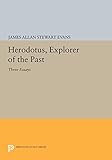Herodotus, Explorer of the Past : Three Essays / James Allan Stewart Evans.
Material type: TextSeries: Princeton Legacy Library ; 1171Publisher: Princeton, NJ : Princeton University Press, [2014]Copyright date: ©1990Edition: Course BookDescription: 1 online resource (180 p.)Content type:
TextSeries: Princeton Legacy Library ; 1171Publisher: Princeton, NJ : Princeton University Press, [2014]Copyright date: ©1990Edition: Course BookDescription: 1 online resource (180 p.)Content type: - 9780691605852
- 9781400861859
- 938/.007202 20
- D56.52.H45 E93 1991eb
- online - DeGruyter
- Issued also in print.
| Item type | Current library | Call number | URL | Status | Notes | Barcode | |
|---|---|---|---|---|---|---|---|
 eBook
eBook
|
Biblioteca "Angelicum" Pont. Univ. S.Tommaso d'Aquino Nuvola online | online - DeGruyter (Browse shelf(Opens below)) | Online access | Not for loan (Accesso limitato) | Accesso per gli utenti autorizzati / Access for authorized users | (dgr)9781400861859 |
Frontmatter -- CONTENTS -- PREFACE -- ABBREVIATIONS USED IN CITATIONS -- INTRODUCTION -- Essay One. THE IMPERIALIST IMPULSE -- Essay Two. INDIVIDUALS IN HERODOTUS -- Essay Three. ORAL TRADITION IN HERODOTUS -- BIBLIOGRAPHY -- INDEX
restricted access online access with authorization star
http://purl.org/coar/access_right/c_16ec
Why does a power expand and become an empire? Writing in the early years of the Peloponnesian War, Herodotus gave Athens full credit for saving Greece from Persia, but also identified the city's expansion as a new manifestation of imperialist aggression. In this skillful analysis of Herodotus' intellectual world, J.A.S. Evans combines historical, anthropological, and literary techniques to show how the war affected not only the great thinker's view of Persian aggression and of the people involved in it but also the shape of the Histories themselves. The first essay discusses Herodotus' investigation of imperialism, and the second finds the beginnings of biography in his descriptions of individuals, particularly in his well-crafted portrait of Cyrus. The third essay describes the "Father of History" as a collector and evaluator of local oral stories, sources for the written work that was destined by its scope and unifying plan to introduce a new genre. Evans draws analogies between Herodotus' methods and those of oral historians in other cultures, particularly in precolonial Africa. He also explores comparisons between Herodotus in Egypt and sixteenth-and seventeenth-century European ethnologists in the Americas.Originally published in 1990.The Princeton Legacy Library uses the latest print-on-demand technology to again make available previously out-of-print books from the distinguished backlist of Princeton University Press. These editions preserve the original texts of these important books while presenting them in durable paperback and hardcover editions. The goal of the Princeton Legacy Library is to vastly increase access to the rich scholarly heritage found in the thousands of books published by Princeton University Press since its founding in 1905.
Issued also in print.
Mode of access: Internet via World Wide Web.
In English.
Description based on online resource; title from PDF title page (publisher's Web site, viewed 30. Aug 2021)


